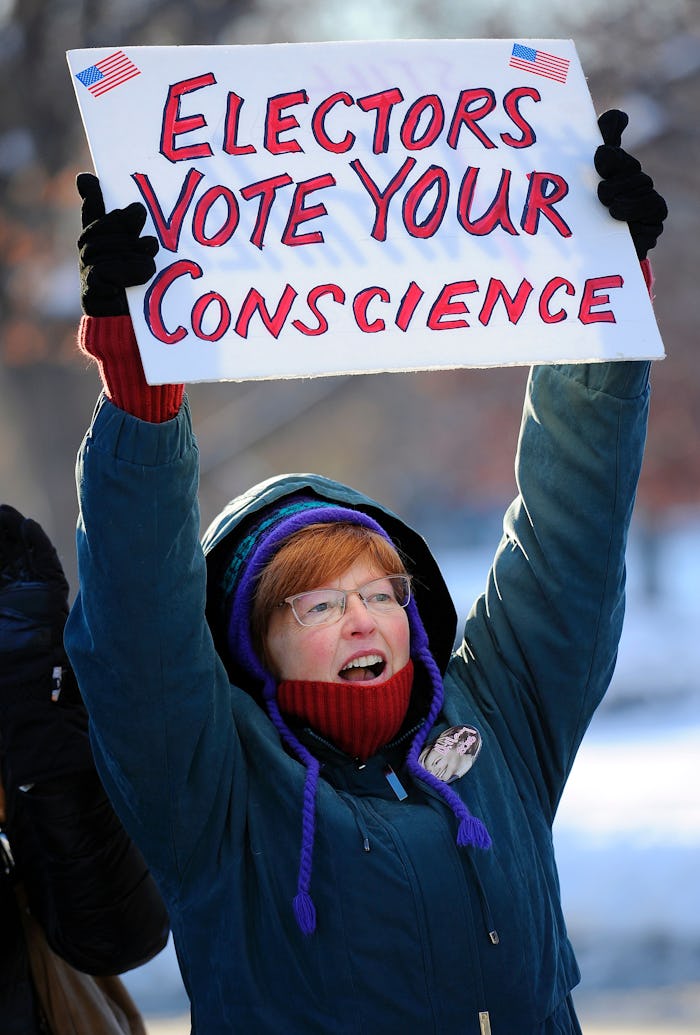News

Why Does The Vote Go To Congress If Electors Don't Confirm The President? It's Complicated
On Monday, electors across the country will join in their respective state capitols to cast the votes that will officially make Donald Trump the 45th President of the United States. Leading up to the Electoral College vote, many have been lobbying — begging, even — electors to deny Trump the 270 votes necessary to officially be elected president. But even if that happens, which reports say is unlikely, the vote would then go to the House of Representatives. Why does the vote go to Congress if electors don't confirm the president? Democratically-elected representatives from each state seemed like an acceptable alternative to the Electoral College to the Constitutional framers.
The Constitution's 12th amendment stipulates there will be a "contingent election" in the House should the Electoral College not give enough votes to any candidate. Article II, Section 1, Clause 3 of the Constitution explains the role of the House in deciding the president should the Electoral College find itself unable to reach the necessary votes. According to the House of Representatives History, Art & Archives the Constitution reads:
...and if there be more than one who have such Majority, and have an equal Number of Votes, then the House of Representatives shall immediately chuse (sic) by Ballot one of them for President...
The Senate would elect the vice president, according to the House Archives. If the House of Representatives can't vote to determine a president-elect, then the vice president-elect, assuming the Senate was able to make a selection, would serve until the House elects a president, according to the League of Women voters.
Electors who are pledged to a candidate but for whatever reason do not cast their vote for that candidate are called "faithless electors," according to NBC News, which reported that, since 1948, there have only been a total of nine faithless electors.
According to Slate, if Trump was unable to reach 270 votes in the Electoral College, which almost no one thinks could happen Monday, the House of Representatives, which is controlled by Republicans, would vote for the president from the top three candidates. As Slate reported, the top two would obviously be former Secretary of State Hillary Clinton and Donald Trump. It's unclear who the third name up for consideration might be should the House vote. But regardless, with the House under Republican control, the likely vote would still be to make Trump the president. So forcing the vote out of the hands of the Electoral College wouldn't really be an effective way to change the outcome of the election.
Over the course of American history, only two Presidential elections have been determined by the House, one in 1800, and the other in 1824, according to the House Archives.
Evidence of Russian hacking in order to sway the election outcome, deep concerns about Trump's ties to Russia, and Trump's alleged conflicts of interest between his business and the duties of the president have caused many Trump opponents to invoke American founding father Alexander Hamilton, who wrote the electoral college is intended to be a "fail safe" against foreign government influence over the president.
"One-eighth of Trump's 306 electors, 38 of them, would need to desert him for another Republican, and then if the Democrats were to join those 38—maybe vote for John Kasich, then Kasich could have 270 electoral votes," Electoral College expert Mark Weston told the Chicago Tribune. "Unless the Democrats join in, no one is getting the majority, in which case the election goes to the House of Representatives, and it's Republican."
Whether you consider the Electoral College to be fundamentally undemocratic or a last fail safe for democratic elections, there is no indication there will be a break with history this year or that the House of Representatives would vote any differently than pledged delegates should the Electoral College be unable to confirm Trump's election. It's cold comfort for Clinton voters, who elected her in a popular vote lead that's now at 2.8 million, according to CBS News.
Trump won the Electoral College vote. And now he's likely to be president, regardless of how electors vote on Monday. Sending the decision to the House won't change that outcome.